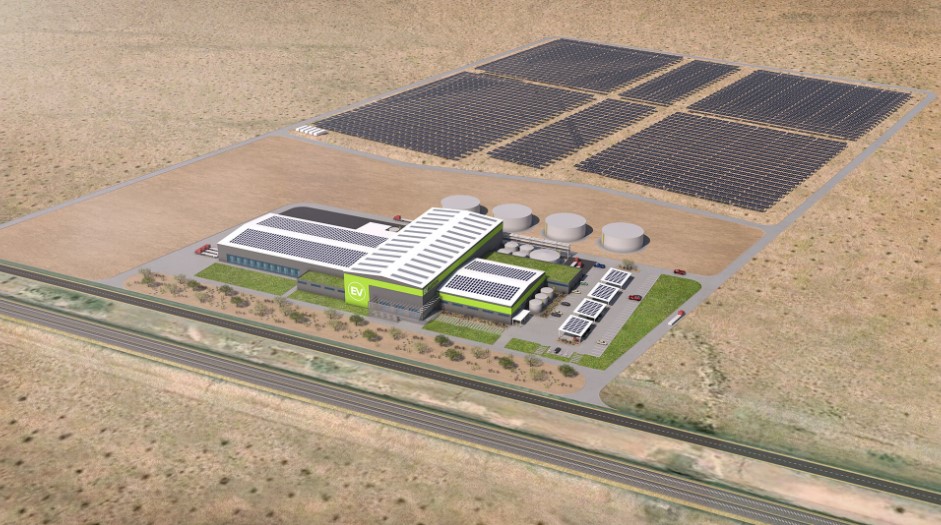By Terri Jo Neff |
An Arizona company has announced plans to ship African-mined cobalt to Mexico, then truck it north to be processed at a new, state-of-the-art facility in Yuma County so it can be sold to companies that make batteries for Electric Vehicles (EVs).
EVelution Energy is expected to start construction of its Yuma cobalt processing facility next year, with a goal of being operational no later than early 2026. It forecasts more than 1,000 construction phase jobs, along with 60 direct and 300 indirect jobs once the facility is fully functional.
Cobalt is a rare, ferromagnetic metal primarily used in lithium-ion batteries and in the manufacture of magnetic, high-strength alloys. Dating back to 3000 BC, cobalt was mostly used for its blue coloring in the making of ceramics and glass.
Other uses were limited due to the fact arsenic fumes are a by-product of smelting. But new processing methods in the last few decades changed all of that.
In March, the Yuma County Board of Supervisors unanimously approved a special-use permit allowing EVelution to move forward with construction on 139 acres just east of the City of Yuma and south of the Kofa National Wildlife Refuge.
The property, which spans Union Pacific Railroad tracks and U.S. Interstate 8, is located within one of Arizona’s Qualified Opportunity Zones which provide a wide range of tax incentives for private, long-term investments in economically distressed communities.
There are also various federal economic development incentives currently available for EVelution Energy’s project, such as the Inflation Reduction Act and the Infrastructure Investment and Jobs Act.
According to the U.S. Geological Survey, nearly two-thirds of all mined cobalt (150,000 tonnes in 2019) comes from the Democratic Republic of the Congo (100,000 tonnes in 2019). The USGS also estimates there is about 4 million tonnes of cobalt reserves on the African continent, and another 3 million tonnes globally.
EVelution plans to transport cobalt hydroxide feedstock sourced from the Democratic Republic of the Congo to a port in Ensenada, Mexico, a roughly four hour trip by truck to the Yuma processing facility. And the company knows there is domestic market for its product.
Currently, more than 70 percent of the world’s battery grade cobalt is processed in China. That puts U.S.-based Electric Vehicle manufacturers overly reliant on imports.
The Yuma cobalt facility’s expected annual 7,000 tonnes capacity could meet 40 percent of the expected demand for U.S.-produced EVs in 2027.
The forecasted $55 million economic benefit from EVelution Energy’s project is very much needed, particularly in southwestern Arizona. However, two environmental concerns will be closely monitored even though Yuma County approved the company’s special use permit.
First is the sourcing and disposal of water. EVelution expects to use 74 million gallons of water per month. The water will be sourced from aquifers running under the property, likely via wells which will run more than 1,000 feet deep.
“Our water usage is therefore not expected to impact the surrounding area’s water table/groundwater,” the company says, adding that a water treatment plant will allow for about 70 percent of its used water to be recycled.
The second concern is the disposal of “tailings,” which are the unused materials which remain after processing. EVelution intends to minimize risks of potential contamination to its or surrounding land by foregoing on-site tailing ponds.
“Tailings will be collected, transported and safely disposed of at a licensed local landfill located less than 20 miles away,” the company says.
EVelution Energy is also focused on transitioning to a net zero carbon future. Getting there will mean building a 38.4 MW (peak) solar power array to power the processing plant. The company expects to use excess power from the day to recharge its battery storage.
There is also the possibility some of the excess electricity can be sold to a local power utility to service nearby agricultural companies.
“Solar power will heat the water and process solutions for hydrometallurgical cobalt processing,” according to the company’s website. ‘This heated solution will be stored at temperature in large storage tanks overnight. Using solar power rather than propane or natural gas will further reduce our carbon-footprint.”
As with most mining operations in Africa, there are concerns with the health impacts to workers and with the use of child labor. EVelution’s website shows the company is aware of those issues.
“We are committed to sourcing cobalt in a socially responsible manner, preventing child labor and to promoting respect for human rights of people employed in or affected by our cobalt supply chain,” the website states. “We plan to source our cobalt only from companies that comply with the guidelines of the Responsible Cobalt Initiative.”
EVelution’s proximity to California could lead to further revenue streams, given that state’s early acceptance of EVs.
With EV batteries being quite heavy, and thus expensive to transport, the company is “well positioned to potentially recycle EV batteries from electric vehicles that reach the end of their product lifespan,” its website notes. “The oldest electric vehicles are predominantly located in California and therefore their batteries will be in need of recycling the soonest.”
Terri Jo Neff is a reporter for AZ Free News. Follow her latest on Twitter, or send her news tips here.








